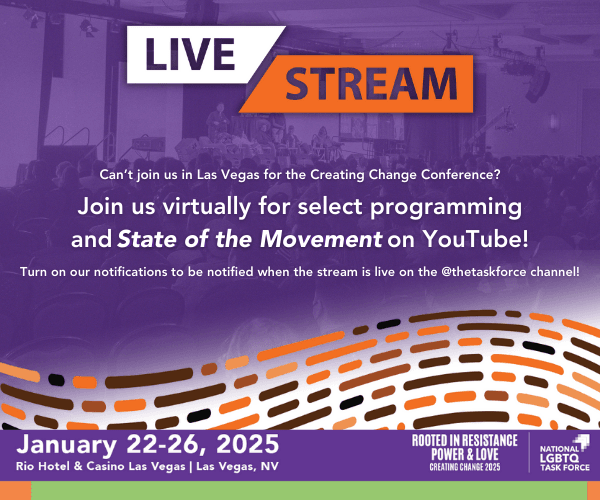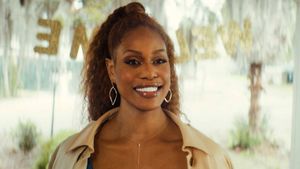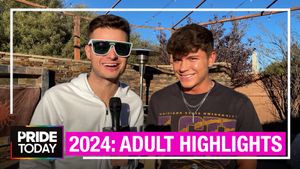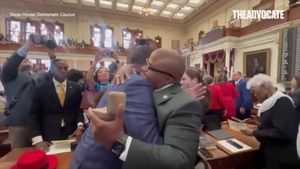Transgender, nonbinary, and gender-diverse youth face challenges and harms in foster care, the justice system, and homeless services, says a new report released Monday for International Youth Day.
“Safe Havens II: We Must Affirm and Support Transgender, Nonbinary, and Gender Diverse Youth in Out-of-Home Systems” combines recommendations for system improvement from young advocates with lived experience in these systems with an update on important law and policy protections and attacks on these young people. Elliott Hinkle, a nonbinary person with lived experience in foster care and founder and principal of Unicorn Solutions, teamed with Lambda Legal, Children’s Rights, and the Center for the Study of Social Policy to update information and recommendations made in a 2017 report.
“Let youth have a say in their care, in their lives, and in their existence — it is just such a vital part of what I would push for,” said Emilio, one of the contributors.
The 2024 report highlights the federal and state laws and policies in place to support these young people in out-of-home systems but also notes the dearth of programs to safely prevent system involvement and promote youth acceptance by their families and communities. The report calls out the unique and disproportionate poor health outcomes experienced by nonbinary and gender-diverse people in comparison to their binary trans and cisgender peers.
The report also reveals challenges that trans, nonbinary, gender-diverse, and LGBQ+ youth face in out-of-home systems across the nation and the harm caused by recent anti-LGBTQ+ laws. In 2024, there has been a documented increase in anti-LGBTQ+ laws and policies at the state level, particularly affecting trans and nonbinary youth. Among them:
•Forty-six states have no explicit law or policy protecting youth experiencing homelessness from discrimination based on sexual orientation or gender identity and expression.
•Twenty-eight states now have harmful laws or policies in place specifically targeting trans, nonbinary, and gender-diverse youth, involving health care access, school curricula, parental notification requirements, restroom and facility access, and sports participation.
•Nineteen of the 28 states with harmful laws or policies also have no explicit protection from gender identity-based discrimination in child welfare or juvenile legal systems.
•Only two states acknowledge the existence of nonbinary youth in child welfare or juvenile legal system law, policy, or practice guidance.
•Only four states have any legal or policy requirement to provide services that help prevent system involvement or to provide services that promote acceptance of LGBTQ+ youth by their families.
“Safe Havens II” calls for a robust response from policymakers and urges the implementation of comprehensive strategies to support young people in their communities, prevent their involvement in the homeless, juvenile legal, and child welfare systems, and protect those already within systems from harm. It also emphasizes the importance of integrating the advice of youth with lived experience, and specifically transgender, nonbinary, and gender-diverse youth — who are consistently invisible in policymaking — in policy and system improvement efforts, ensuring that future policies are anchored in rigorous research rather than stigma and bias.
Seven youth with lived experience contributed to the report. Emilio, Gina, Jaxsyn, Kayden, Paris, Shawn, and Tyler have diverse identities and geographic perspectives. Together they provide a road map for how to better support LGBTQ+ youth. Their work was supported and organized by Hinkle, a transmasculine nonbinary person with lived experience in Wyoming’s child welfare system.
“Young people possess unique ideas, insights, and solutions to the challenges they face. By listening and collaborating with them, we can bring these opportunities for improvement to life,” Hinkle said in a press release. “It cannot be overstated how crucial it is to support trans, nonbinary, and gender-diverse youth in finding joy in their communities and lives. That’s why policymakers should read and follow the timely and critical recommendations they share in the report based on the traumatic, discriminatory but also sometimes positive experiences they lived in these systems. Their voices must be heard, their identities affirmed, and their rights protected.”
“The anti-LGBTQ legislation mentally affects me because my community isn’t being protected. Other trans people can’t get the support they need, and it makes me sad,” said Tyler, one of the youth contributors.
“Too many youth and families are separated, experiencing homelessness, or involved with juvenile and criminal legal systems due to lack of affordable housing, living wages, and community supports,” the report states. “Much of the research since Safe Havens I confirms prior findings that LGBTQ+ youth are over-represented in child welfare, juvenile legal, and homeless systems compared to their non-LGBTQ+ peers; are predominately youth of color; and have worse experiences while in out-of-home systems. These experiences and outcomes are not inherent in being TNGD but are a result of systemic and societal failure to support TNGD youth. These failures demonstrate that TNGD youth need more supportive policies in place.”
“Once in these systems, TNGD youth are often failed yet again, and face enormous barriers to accessing support, care, and having their identities affirmed, despite systems’ legal requirements to support the well-being of the youth in their custody, promote their rehabilitation, or provide safe and supportive housing,” it continues. “Youth and families do not get the support they need and experience harm from the system itself. TNGD youth must navigate complex, underfunded, and disjointed social and economic support systems as they try to find family and community acceptance, secure safe and affordable housing, pursue their education, find employment, and access health care — all in the context of public policies that often deny their identities.”
“The alarming findings in this report reveal the enormous work that remains to be done to ensure every child is supported and affirmed when interacting with government and government-funded systems and the specific needs of TNGD youth are met. While some states improved their policies, the large majority of states lack key protections, policies, and guidance to serve and care appropriately for TNGD and LGBQ+ youth,” Currey Cook, senior counsel and youth in out-of-home care project director for Lambda Legal, said in the press release. “What we heard from youth who have lived through these systems is that their identities have not been recognized, they feel lost and invisible, even often abused and criminalized. We are proud to share this report, which includes an important and robust call to action from TNGD youth with system experience who share how policymakers should address new and chronic challenges.”
Pose actress Dominique Jackson moderated a launch event for the report. Videos from the youth contributors can be viewed here.
- YouTubewww.youtube.com


















































































